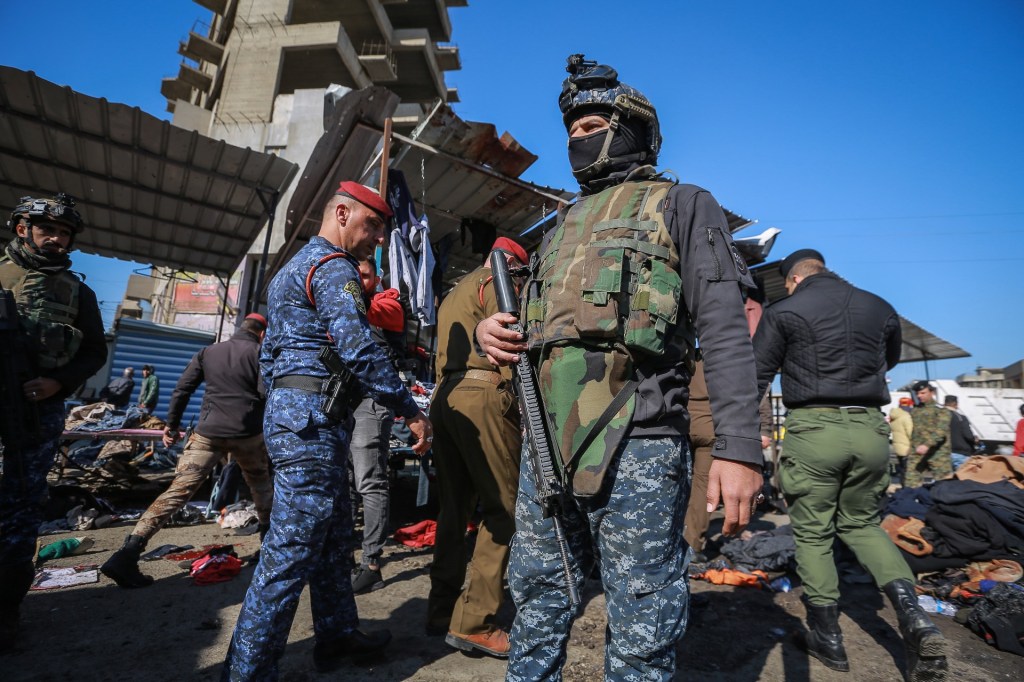A rare twin suicide bombing hit a busy market in Baghdad on Thursday morning, killing at least 32 people and injuring 110, in what is the first suspected ISIS attack in the Iraqi capital in three years.
The market at Tayaran Square in the Bab al-Sharqi area on the east of the Tigris river mainly sells food and second-hand clothes, and is mostly visited by Baghdad’s low-income residents. During today’s morning rush hour, two different explosions shook the area, bringing back horrific memories of the Islamic State suicide attacks that plagued civilians living in the capital before the Iraqi government declared victory over the group in late 2017.
Videos by VICE
The market was also the target of an ISIS suicide bombing in January 2018, when 35 people died and 90 others were injured.
On Thursday videos circulating on social media and local television showed a group gathered around a man who appeared to be asking for help, before seconds later a burst of flame throws bodies to the ground. The second bomber detonated his suicide belt a few hundred metres away, according to the witnesses in the area and local security forces.
The Islamic State group lost control of all its territory in Syria and Iraq by March 2019. However, the group remains active in the Hamrin mountains ranges in the north of the country, and the desert on the Syrian border. Although ISIS did not claim responsibility for Thursday’s attack, officials said it was their work. The attack signals a worrying return of ISIS sleeper cells sowing destruction and spreading fear.
Detonating two suicide vests in a crowded area was a go-to tactic for Sunni insurgents at the height of the Iraqi sectarian war between 2005 and 2006.
Baghdad’s chief of civil defence, Kadhim Salman, spoke to local media at the site of the explosion after it was secured, saying: “No one has claimed responsibility yet, but the enemy is clear, and it is most likely ISIS terrorists are behind this crime.”
Salman said the number of casualties might be higher than the “preliminary numbers” as authorities are still receiving updates on victims taken to nearby hospitals.
Yehia Rasool, the Iraqi armed forces spokesperson, said in a tweet that an investigation into the incident was ongoing.
In recent years the Iraqi capital has become more accustomed to rocket attacks by pro-Iranian militias on American forces inside the fortified Green Zone than Sunni religious violence, but even those attacks have dropped off since last autumn as Tehran waited to see whether Donald Trump would secure another four years in the White House.
Domestically, Iraqi politics and security remain a mess. The current prime minister, Mustafa Kadhimi, the former head of Iraqi intelligence, heads a caretaker cabinet appointed to deliver an early election – which he has delayed already until October 2021 because of COVID.
Kadhimi, considered a pro-western figure, is still facing the economic challenges that ousted his predecessor Adil Abdul Mahdi, who had to resign after facing mass youth-led demonstrations demanding jobs and better quality services, in what became known as the “October Revolution” in 2019.
Barham Salih, the Iraqi president, described the elements behind Thursday’s attack as “shadow forces,” saying in a tweet: “The two terrorist explosions against the safe civilians in Baghdad, and the timing of the attack shows the dark groups targeting our major national achievements, and people’s aspiration of peace.”
“We stand firmly against these rogue attempts to destabilise our country,” he added.






